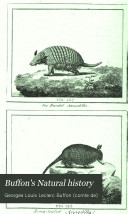An Early Passage on Taxonomy
NATURE, by descending gradually from great to small, from strong to weak, coun|terbalances every part of her works. Attentive solely to the preservation of each species, she creates a profusion of individuals, and supports by numbers the small and the feeble, whom she hath left unprovided with arms or with courage. She has not only put those inferior animals in a condition to perpetuate and to resist by their own numbers, but she seems, at the same time, to have afforded a supply to each by multiplying the neighbouring species. The rat, the mouse, the field-mouse, the water-rat, the short tailed field mouse, the fat squirrel, the garden squirrel, the dormouse, the shrew-mouse, and several o|thers, whom I mention not, because they belong not to our climate, form so many distinct and separate species, but so analogous to each other, that, if any one should happen to fail, the gap in the genus would hardly be perceptible. It is this great number of neighbouring species which hath given to naturalists the idea of genera; an idea which can only be employed when we view objects in general, but which vanishes whenever we consider nature in detail.
Men at first gave distinct names to objects which appeared to differ from each other; and, at the same time, they gave general denominations to objects that seemed to be nearly similar. A|mong a rude people, and in the infancy of all lan|guages, there is hardly any thing but general terms, or vague and ill-formed expressions for objects of the same order, though very different from each other. An oak, a beech, a linden-tree, a fir, a pine, a yew, would, at first, have no other name but that of a tree; afterwards the oak, the beech, and the yew, would all be called oak; when these were distinguished from the fir, the pine, and the yew, the three latter would be called fir. Particular names could only be in|vented in consequence of a minute examination of each different species; and the numbers of these names are augmented in proportion to the extent of our knowledge of Nature: The more we examine her, proper and particular names will become more frequent. When natural ob|jects, therefore, are represented to us, under ge|neral denominations, or by classes and genera, it is recalling the darkness peculiar to the infant state of human knowledge. Ignorance is the parent of genera; but science will for ever con|tinue to create and to multiply proper names; and I shall never hesitate in adding to their num|ber, as often as I have occasion to delineate dif|ferent species.
Notes:
The ability to distinguish and categorize species based on more and more minute differences, and yet be able to group them into larger categories as well.
Folksonomies: tagging folksonomies taxonomy
Taxonomies:
/science/physics/electromagnetism (0.498918)
/home and garden (0.351187)
/science (0.240728)
Keywords:
neighbouring species (0.931135 (positive:0.263359)), particular names (0.798126 (positive:0.461818)), Early Passage (0.712492 (neutral:0.000000)), larger categories (0.708108 (neutral:0.000000)), inferior animals (0.698378 (neutral:0.000000)), Taxonomy The ability (0.697407 (neutral:0.000000)), garden squirrel (0.685007 (positive:0.200508)), ill-formed expressions (0.681890 (negative:-0.433933)), fat squirrel (0.681748 (negative:-0.265019)), field mouse (0.670466 (negative:-0.214231)), rude people (0.668398 (negative:-0.626468)), distinct names (0.665170 (neutral:0.000000)), ge|neral denominations (0.664842 (neutral:0.000000)), great number (0.660789 (positive:0.263359)), general denominations (0.660611 (neutral:0.000000)), natural ob|jects (0.658334 (positive:0.267424)), infant state (0.656206 (positive:0.373352)), dif|ferent species (0.649880 (negative:-0.210848)), general terms (0.649351 (neutral:0.000000)), human knowledge (0.646910 (positive:0.373352)), proper names (0.644258 (positive:0.256542)), different species (0.638802 (neutral:0.000000)), objects (0.600977 (negative:-0.433933)), yew (0.572908 (positive:0.221476)), nature (0.565361 (positive:0.010161)), numbers (0.562218 (negative:-0.070539)), fir (0.558096 (positive:0.260857)), oak (0.520107 (positive:0.310609)), time (0.502752 (neutral:0.000000)), beech (0.502247 (positive:0.295026))
Concepts:
Species (0.961920): dbpedia | freebase | opencyc
Rodent (0.677693): dbpedia | freebase | opencyc
Rat (0.652246): dbpedia | freebase | opencyc
Genus (0.619122): dbpedia | freebase
Knowledge (0.525233): dbpedia | freebase
Mouse (0.523555): dbpedia | freebase | opencyc
Order (0.510394): dbpedia | freebase
Binomial nomenclature (0.501547): dbpedia | freebase





